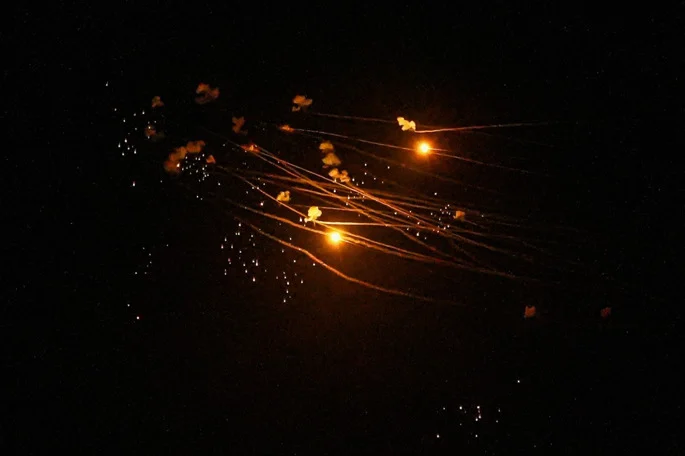
‘We Are Not Afraid’: Israelis Strong In Faith Amid Missile Barrage and Terror Attack
by Tzali Reicher – chabad.org
The Islamic Republic of Iran fired an unprecedented barrage of nearly 200 ballistic missiles at Israel on Tuesday evening local time, sending more than 10 million people into bomb shelters as Red Alerts and sirens wailed throughout the country. The attack began just hours before the onset of Rosh Hashanah, the Jewish new year.
Israeli officials and news outlets began warning of the imminent strike only hours before it began, sharply contrasting the days of warnings civilians had during Iran’s first drone and missile assault on Israel in April. It was soon clear that an extensive and large-scale attack was about to take place, targeting cities throughout the entire country.
As Israel prepared for the Iranian attack, two terrorists opened fire in Jaffa, near Tel Aviv, killing six and injuring several others just minutes before Iranian missiles appeared overhead. The shooting occurred by a light-rail station, and the terrorists were seen exiting the train before they were eliminated by a security officer and armed civilians.
Early reports indicate the attackers hailed from Hebron, one of Israel’s four holy cities.
Just after 7:30 p.m. local time, Israel’s Home Front Command and alert systems announced that the attack had begun and sent the country into their saferooms as rockets and interceptors battled overhead.
Live pictures detailing scenes in downtown Tel Aviv showed the falling shrapnel impacting while residents in Tzfat (Safed) reported seeing a number of missiles being intercepted before them. A video from Jerusalem showed the rockets soaring over the Western Wall and the Temple Mount, and Israel shut down their airspace as the attack was unfolding.

The Home Front Command reopened Israeli airspace and allowed residents to leave shelters a little more than an hour after the attacks began, and Israel’s ambulance service Magen David Adom reported only two light shrapnel injuries across Israel due to the attack. Palestinian news sources reported that a Palestinian man was killed by falling missile debris in the village of Nu’eima, near Jericho.
Just hours after it had been filled with Jewish children learning about Rosh Hashanah, Chabad of Gadera’s Shalhevet School, which is part of Chabad’s Reshet Oholei Yosef Yitzchok network of educational institutions, sustained a direct hit from a missile that destroyed the building. Miraculously, it was the empty school that was struck, not the numerous apartment buildings filled with hundreds of people that surround it.
Ahead of the missile barrage the Chabad-Lubavitch Beit Din of Israel issued a call to action based on directives of the Rebbe, Rabbi Menachem M. Schneerson, of righteous memory, to increase in the study of Torah and performance of mitzvot in the merit of Israel’s protection. It highlighted the importance of increasing in the study of Torah, recitation of Tehillim (Psalms) and giving charity for the protection of Israel.
“I think that the mood of the people in Israel is also part of the miracles of this war. The spirit here is that G‑d is protecting us, that there’s going to be miracles and we’re not afraid,” said Rabbi Asi Spiegel of the Chabad Youth Organization of Israel, who was in Tzfat for the duration of the attack. “Obviously, there are tense moments, and we do our part to stay safe: We follow instructions, shelter in safe rooms and wait for guidance. But we’re seeing in the miraculous results of this attack—no deaths, only light injuries, thank G‑d—that the Rebbe’s words ring true. Israel is the safest place in the world, and we’re happy that we get to witness it.”
Weeks after the Persian Gulf War in 1991, Ron Nachman, the mayor of Ariel, Israel, visited the Rebbe in Brooklyn, N.Y. In addition to bringing news of his town’s growth, he highlighted Iraq’s recent missile attack on Israel—during which Israel suffered no casualties—asking for the Rebbe’s blessing for the Land of Israel “in light of the wonders and miracles that we witnessed during the Gulf War.”
“From now on, may there be no need for miracles above nature,” the Rebbe responded, “but there should be success within nature itself.”











